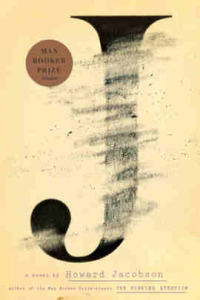J by Howard Jacobson
 Monday, December 1, 2014 at 8:32AM
Monday, December 1, 2014 at 8:32AM 
First published in Great Britain in 2014; published by Hogarth on October 14, 2014
J is accurately marketed as a "philosophical work of fiction." It is, unfortunately, strong on philosophy and weak on fiction. To his credit, Howard Jacobson raises important questions and avoids glib answers. He just doesn't do a very good job of storytelling.
The novel's beginning sets a promising scene. J takes place in a future of shared conventional thinking. Spontaneity and unpredictability are scorned. Jazz, wit, and other forms of improvisation have fallen out of favor. Art is a "primordial celebration of the natural world." It is meant to provoke feelings of tranquility and harmony, not anxiety or despair.
Prevailing sentiment in Jacobson's future is that we must forget the past. Conversations about the seminal event of the relatively recent past begin with "what happened, if it happened." The "twin itches" of recollection and penance are no longer scratched. People apologize without reference to any offense for which an apology might be due because random apologies eradicate and anesthetize guilt. Walls and monuments that commemorate war and suffering are gone, the "recriminatory past" replaced with an "unimpeachable future." Access to books (and therefore ideas) is restricted. Even "hoarding heirlooms" is an offense, although one the authorities will overlook if it is not carried to excess.
It is against this wonderfully detailed background that a plot fails to emerge. Instead, Jacobson gives the reader a jumble of loosely connected storylines. It is as if Jacobson put all of his effort into creating the story's background and failed to find a story that would fit within it.
One plot thread involves a romance between Kevern "Coco" Cohen, the child of parents who hid their past from him while they are still alive, and his lover Ailinn, who thinks that memories are best forgotten since memories are mostly bad. Kevern slowly uncovers his past as the story slowly moves forward. The path he travels is full of dull digressions.
Another thread is something like a murder mystery as a detective investigates a series of deaths. That story goes nowhere. Another involves a woman who had an affair with her teacher who seems to have been added to the story only because someone needed to provide an explanation of what happened, if it happened. Then there's an art historian who exists to reinforce the book's central conceit while adding little of substance to the novel.
While I was unimpressed with Jacobson's story (or failure to tell a story), I found the novel worth reading for its thoughtful exploration of ideas. One set of characters, for example, wars over the dichotomy of "never forget" and "don't live in the past." Having conquered oppression, a character suggests, "there is no need for all the morbid remembering and re-remembering. I don't say we should forget, I say we have been given the chance to progress and we should take it." Through its characters, the novel allows competing philosophies to spar: acknowledging that the past is past should not bring "automatic absolution" for past atrocities versus the sense that people of the present should not be made to bear the burden of guilt for things done by earlier generations. Jacobson also has some insightful things to say about cultural identity as a "shapely, long-ingested, cultural antagonism, in which everything, from who we worship to what we eat, is accounted for and made clear. We are who we are because we are not them."
Jacobson is a clever prose stylist -- sometimes too clever, he conveys the sense of a writer being clever for the sake of being clever -- but the cleverness kept me reading even when I had doubts about the content. There are some lengthy dead spots, including a woman in a coma whose search for words might have made a strong creative writing essay but added little to Jacobson's effort. The characters are haphazard constructs of beautiful prose; I wish Jacobson had made them worthy of the language he expended on them. For ideas and style, I would recommend J; for plot and storytelling, I cannot. My Recommended With Reservations is a compromise verdict.
RECOMMENDED WITH RESERVATIONS

